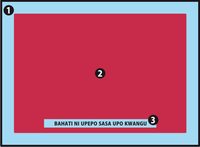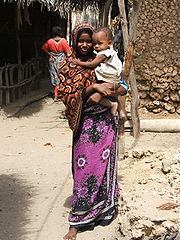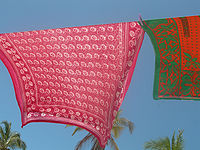
Kanga (African garment)
Encyclopedia

Kitenge
Kitenge or chitenge is an African garment similar to sarong, often worn by women wrapped around the chest or waist, over the head as a headscarf, or as a baby sling....
, worn by women and occasionally by men throughout Eastern Africa
East Africa
East Africa or Eastern Africa is the easterly region of the African continent, variably defined by geography or geopolitics. In the UN scheme of geographic regions, 19 territories constitute Eastern Africa:...
. It is a piece of printed cotton
Cotton
Cotton is a soft, fluffy staple fiber that grows in a boll, or protective capsule, around the seeds of cotton plants of the genus Gossypium. The fiber is almost pure cellulose. The botanical purpose of cotton fiber is to aid in seed dispersal....
fabric
Textile
A textile or cloth is a flexible woven material consisting of a network of natural or artificial fibres often referred to as thread or yarn. Yarn is produced by spinning raw fibres of wool, flax, cotton, or other material to produce long strands...
, about 1.5m by 1m, often with a border along all four sides (called pindo in Swahili), and a central part (mji) which differs in design from the borders. Kangas are usually very colorful.
Origins

Communication vehicle

Arabic language
Arabic is a name applied to the descendants of the Classical Arabic language of the 6th century AD, used most prominently in the Quran, the Islamic Holy Book...
or Comorian
Comorian language
Comorian is the most widely used language on the Comoros and Mayotte. It is a set of Swahili dialects but with a much stronger Arabic influence than standard Swahili...
. Other countries which produce their own Kangas write the Kanga messages/names in their main languages: in Madagascar
Madagascar
The Republic of Madagascar is an island country located in the Indian Ocean off the southeastern coast of Africa...
(Malagasy Republic) where they are known as lambas
Lamba (garment)
A lamba is the traditional garment worn by both men and women in Madagascar. This textile, highly emblematic of Malagasy culture, consists of a rectangular length of cloth wrapped around the body....
, they feature ohabolana, traditional proverbs written in Malagasy
Malagasy language
Malagasy is the national language of Madagascar, a member of the Austronesian family of languages. Most people in Madagascar speak it as a first language as do some people of Malagasy descent elsewhere.-History:...
; they are also produced in Zambia
Zambia
Zambia , officially the Republic of Zambia, is a landlocked country in Southern Africa. The neighbouring countries are the Democratic Republic of the Congo to the north, Tanzania to the north-east, Malawi to the east, Mozambique, Zimbabwe, Botswana and Namibia to the south, and Angola to the west....
and Malawi
Malawi
The Republic of Malawi is a landlocked country in southeast Africa that was formerly known as Nyasaland. It is bordered by Zambia to the northwest, Tanzania to the northeast, and Mozambique on the east, south and west. The country is separated from Tanzania and Mozambique by Lake Malawi. Its size...
. This message is called the jina (literally 'name') of the kanga. Messages are often in the form of riddles or proverbs. Some examples:
- Majivuno hayafai — Greed is never useful
- Mkipendana mambo huwa sawa — Everything is all right if you love each other
- Japo sipati tamaa sikati — Even though I have nothing, I have not given up my desire to get what I want
- Wazazi ni dhahabu kuwatunza ni thawabu — Parents are gold; to take care of them is a blessing
- Sisi sote abiria dereva ni Mungu — We are all passengers, God is the driver
- Fimbo La Mnyonge Halina Nguvu — Might is right
- Mwanamke mazingira tuanataka, usawa, amani, maendelo — We (women) want equality, peace, and progress
- Naogopa simba na meno yake siogopi mtu kwa maneno yake — I’m afraid of a lion with its strong teeth but not a man with his words

